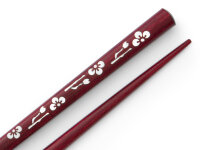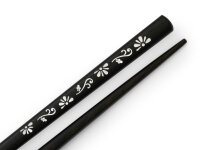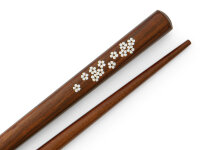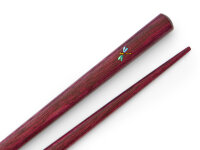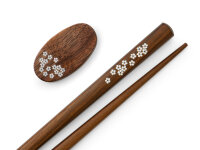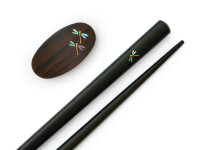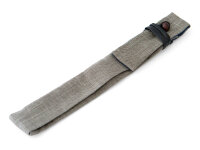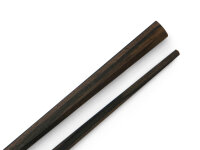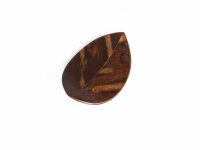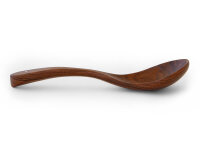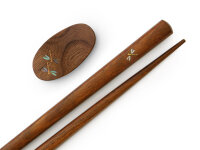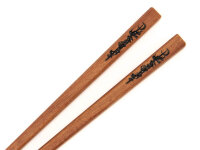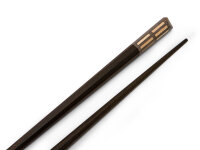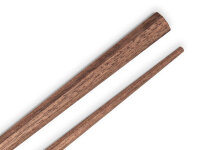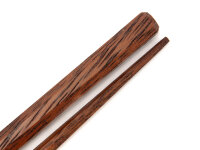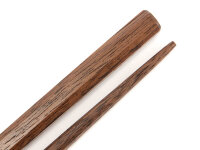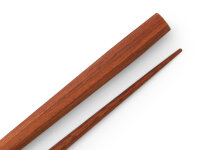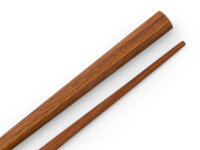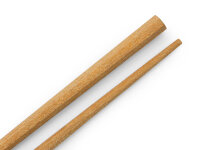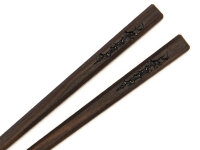"Chopsticks Tonbo, Granadillo"
Zogan, the traditional decoration technique
Zogan is an old, traditional technique used to decorate products made of wood. It is similar to the inlay technique used in well-known Italian decoration. For zogan decoration, the motifs are first carved out of the wood surface and then laid out with pieces of wood or shell. This fine and highly precise work is known mainly from Iwate Prefecture and is an art practiced mostly by women. Kai-Zogan, the technique when only shell pieces are used as inlay, requires not only a steady hand but also a trained eye. The highest quality can be recognized by the fact that the layers of mother-of-pearl not only fit perfectly, but their structure also creates an extremely harmonious, beautiful picture. When a decoration with wood inlays is implemented, it is called moku-zogan. This is no less demanding, only craftsmen with the highest sensitivity manage to combine the different types of wood - often ebony and walnut - into a perfect picture.
Yumekobo: art for things of daily use
The former president of Yumekobo was inspired by the World Heritage Site \"Chusonji Temple\", a temple rich in beautiful Kai-Zogan decorations. The idea of bringing the high art of Kai-Zogan to the people by decorating everyday products with it quickly matured and has accompanied his entire professional life. Thus, Yumekobo quickly became known as a manufactory that decorates especially small products with pretty, vivid motifs in high-quality kai- and moku-zogan technique. Yumekobo chopsticks are especially popular and unique in their design. There are yumekobo hashi with many motifs, such as the four seasons and the numerous lucky charms, which are perfectly executed despite the small area and slight roundness of the chopsticks. The popularity of Yumekobo chopsticks is very high in Japan, as they are very much in line with the growing desire for sustainable, durable and beautiful products.
Chopsticks from Yumekobo: simply beautiful, simply healthy
In Japan, chopsticks are mainly used as cutlery. For food that is already prepared before cooking as bite-sized pieces. But also soups, like the miso soup or noodle soups, can be eaten with pleasure with chopsticks. You fish out the solid parts and drink the liquid from the beautiful lacquerware soup bowls. And even when cooking, chopsticks are handy helpers. A little practice and it is a lot of fun to handle the chopsticks made of precious woods. The chopsticks from Yumekobo are very hygienic due to the valuable, high-quality wood and the excellent, natural processing. The design facilitates the handling, the care is simple.
Granadillo, the sound of infinity
Granadillo is a very attractive precious wood, reddish brown in color with black stripes, and is often used in arts and crafts as well as for bars and fingerboards of guitars. It resembles Rosewood, is relatively rare, and is highly sought after for that reason alone. Like most precious woods, it is heavy, hard, and difficult to work, partly because of its particular grain. Natural oils are ideal for surface treatment. The wood needs quite little care and is extremely durable.
Cleaning
Wash by hand. Keep dry, lightly oil if necessary (olive oil or similar). Avoid high heat

